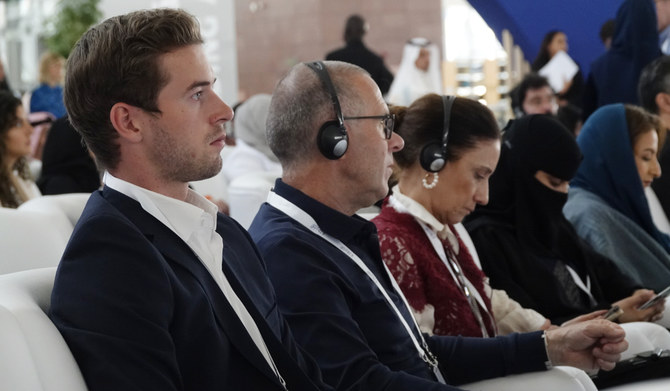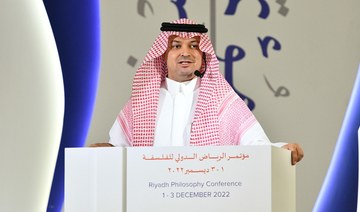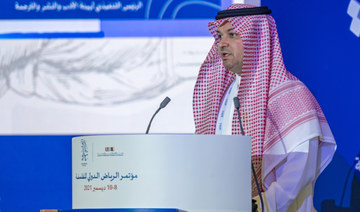RIYADH: Over the course of three days, scientists, writers, historians, professors and philosophers from around the world gathered at the King Fahd National Library in Riyadh to discuss the major issues affecting humanity today.
The second edition of the conference, which concluded on Dec. 3, was dedicated to the theme of “Knowledge and Exploration: Space, Time and Humanity.”
A total of 71 speakers attended from more than 19 countries around the world, including the US, UK, UAE, Mexico, Italy, Singapore, Italy, Germany and Egypt, making the conference a diverse platform to discuss ideas and topics pertinent to our world today. Attendees numbered around 2,700.
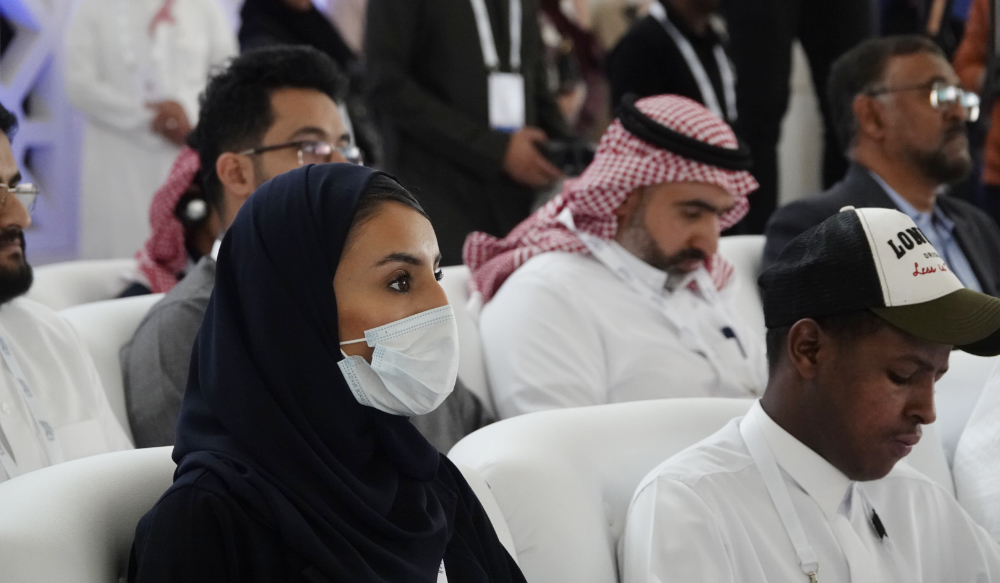
The second edition of the conference was dedicated to questions revolving space exploration and its philosophical and social implications for humanity. (Photo/Huda Bashatah)
“A conference such as this has cross-cultural dialogue at its heart. Inviting and welcoming leading philosophers from all over the world is not a one-way thing,” Dr. Mohammed Hasan Alwan, CEO of the Literature, Publishing & Translation Commission, told Arab News. “It is, instead, a two-way dialogue, with international experts joining their Saudi and regional colleagues in a spirit of intellectual exploration that is far more profound and far-reaching because it is done in a spirit of partnership.”
This year’s conference continues the efforts of last year’s event, which was the first of its kind to take place in the Kingdom of Saudi Arabia. “Our conference has been bigger and more ambitious in many ways,” added Alwan.
The conference was established, he said, “because we believe in philosophy and its relevance in our world.”
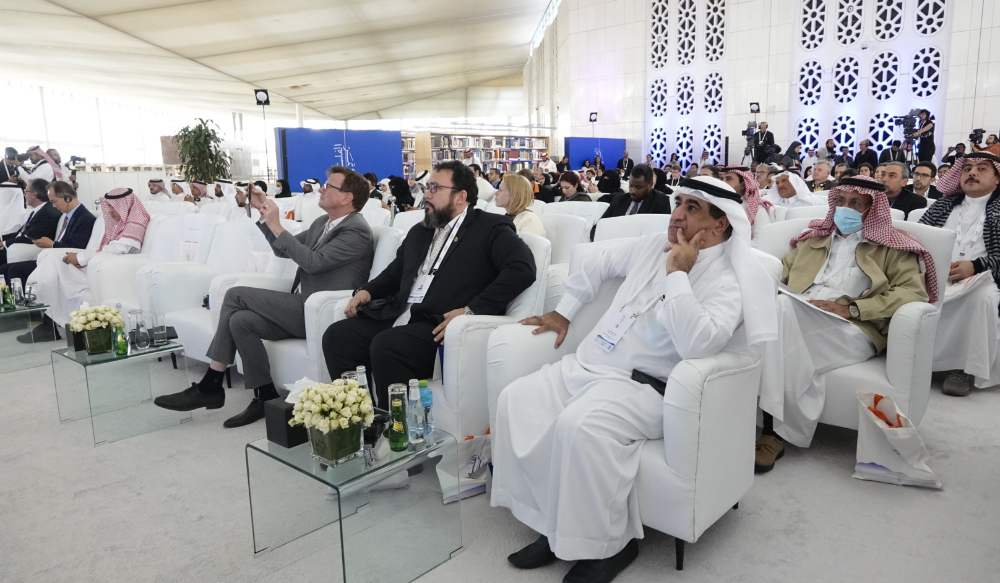
The second edition of the conference, which concluded on Dec. 3, was dedicated to the theme of “Knowledge and Exploration: Space, Time and Humanity.” (Photo/Huda Bashatah)
The theme of the conference was highly topical to ongoing debates surrounding space exploration.
“The conference theme is, to coin a science fiction phrase, ‘going boldly where few conferences have gone before,” said Alwan. “We chose a theme that was challenging, and yet which also showed just how philosophical thinking is absolutely vital for humanity, because of its ability to map out entirely new intellectual territory that relates to space exploration, to humanity’s potential extra-terrestrial activities.”
The topic of space exploration is also reflective of Saudi Arabia’s own plans. In September 2022, the Kingdom announced that it had launched a new astronaut program. Its first journey, set for 2023, will carry a female Saudi astronaut, the Saudi Press Agency reported.
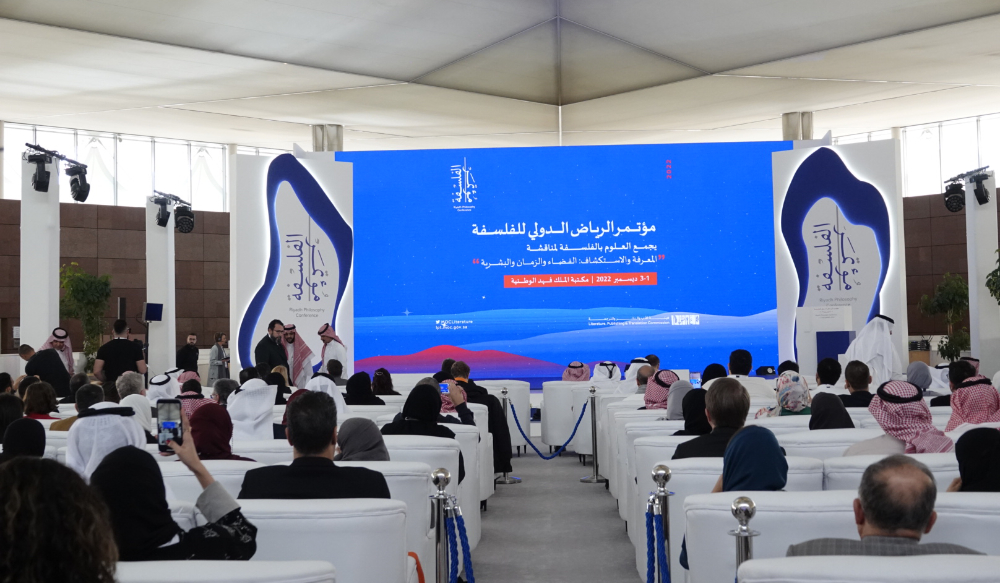
Over the course of three days, scientists, writers, historians, professors, and philosophers from around the world gathered at the King Fahad National Library in Riyadh to discuss pressing major issues affecting humanity today. (Photo/Huda Bashatah)
“What has been impressive is the ability to speak to a diverse and large population here that you don’t find in academic conferences; attendees this year included even investment bankers and people working in the oil industry,” Nicolas de Warren, professor of philosophy at Penn State University in the US, who was attending the conference for the second time, told Arab News. “I was impressed again by the level of sophistication and questions from the diverse audience.”
De Warren chaired a panel titled “Exploring Space and Time Today.” His research looks at the impact of science fiction literature which, as he says, “imagines not only the exploration of space but what it would mean to enter into contact with other life forms or alien civilizations. It is what is called first contact narratives.”
Such ideas raise the fundamental philosophical question of if we as a species are alone in the universe? Are there other life forms? How do we know if there are other life forms? Why has there been no contact with these other life forms? And what would it really represent if, indeed, one day, there was the discovery that there are other intelligent life forms and civilizations?
De Warren discussed such questions in his panel but went a step further. According to his thesis, these questions do not really concern aliens but ourselves.
“It has to do with the way in which we project our planetary fears onto some imaginary alien to sublimate them,” he said. “From that perspective, it’s not fortuitous that during the 1950s and 1960s, one of the dominant genres of science fiction literature and films was invasion narratives — Martians are coming, and so on. That reflects the sort of sublimation one found during the Cold War.”
Apart from delving into pressing issues involving our world today and fostering cross-cultural dialogue, the conference also had a pedagogical aspect.
A pavilion area with workshops for children called Philosophers of Tomorrow, a Philosophical Camp for philosophical dialogue, and a debating competition for trained teams of college students called Reading Between the Lines Competition underlined the importance of fostering philosophy inquiry and thought within educational platforms, schools and communities in the Kingdom.
“We’ve done more than before to encourage children and young people to participate in the conference through a Philosopher’s Cafe, which has space for members of the audience to discuss philosophical topics with the conference’s speakers,” added Alwan.
This year the conference partnered with more organizations, ranging from international universities, the International Federation of Philosophical Societies, as well as the Saudi Space Commission, and several Saudi organizations engaged in promoting philosophical thinking, such as Baseera, the Saudi Center of Philosophy and Ethics, Mekal Philosophy Club and the Saudi Philosophy Association.
“We abstract the tools that philosophers use and try to invite teachers to apply those tools in their curriculum,” said Dalia Toonsi, educational consultant, founder and general manager of Baseera Educational Consultancy. Baseera, an institute that trains teachers to implement dialogical and philosophical teaching as well as learning methods into the curriculum of Saudi schools, was taking part in the event for the second time.
“People in the Arab world generally don’t think philosophy is an interesting subject,” said Toonsi. Baseera’s work emphasizes the importance of philosophical inquiry in schools.
Toonsi said: “Tools from philosophy entail critical thinking, examining assumptions, deduction and reduction, and inquiry and also caring thinking, related more to children, which gives children the ability to open their minds to different opinions related to philosophical inquiry.”






